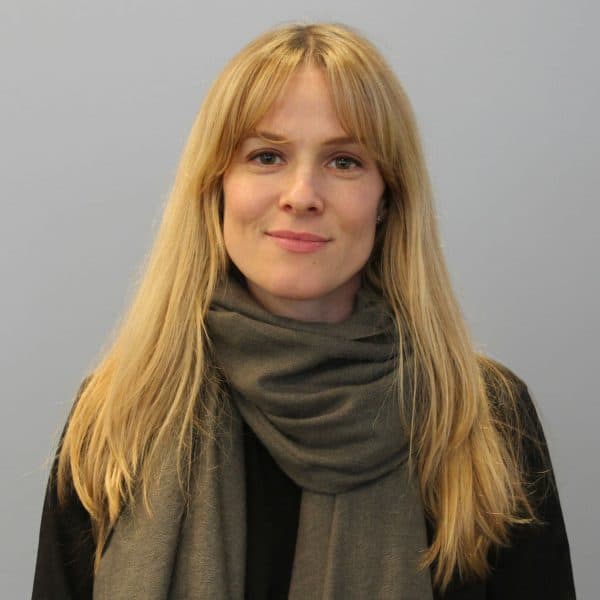Advertisement
Your Stories
Talking With Kids About The News: We Asked, You Answered
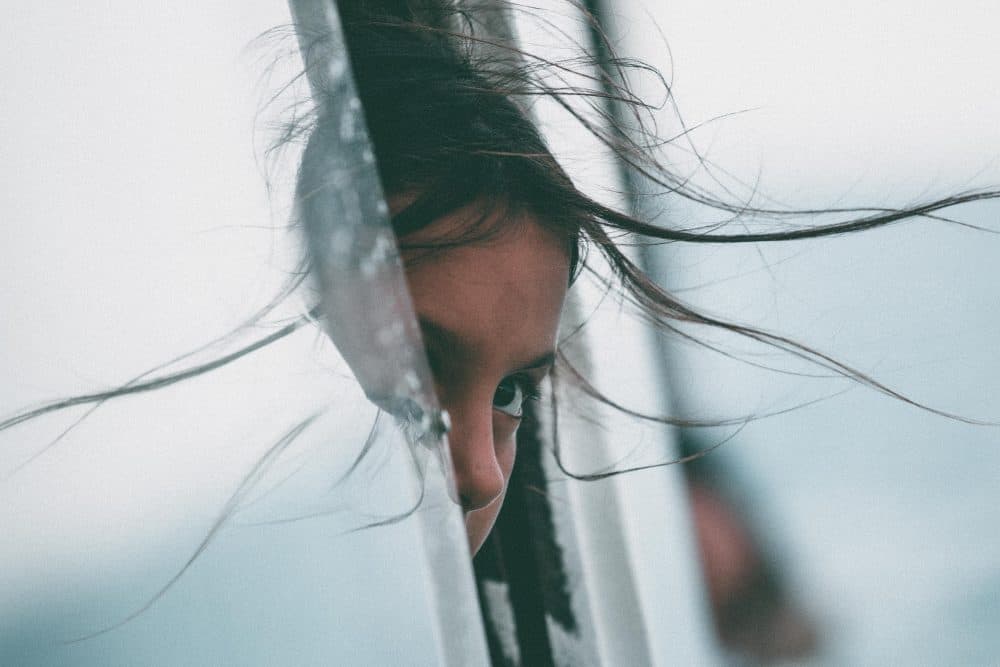
Talking about the news requires parents to find a balance between offering their children safe harbor and exposing them to the often harsh realities of the world.
Families are thinking and talking about how to help their children navigate an environment where every day can bring headlines about school shootings, or packages exploding, or the #MeToo and #BlackLivesMatter movements, or a woman called Stormy Daniels.
The editors of Cognoscenti are also parents of young children. We struggle with these questions too, and so we put out a call to learn more about how moms and dads are finding a balance that’s right for their families and their kids.
Here’s a roundup of some of what we heard via email, social media call-outs and conversations with dozens of people. Some responses have been edited or condensed for clarity.
What are we missing? Leave a comment at the bottom of this post with your thoughts.
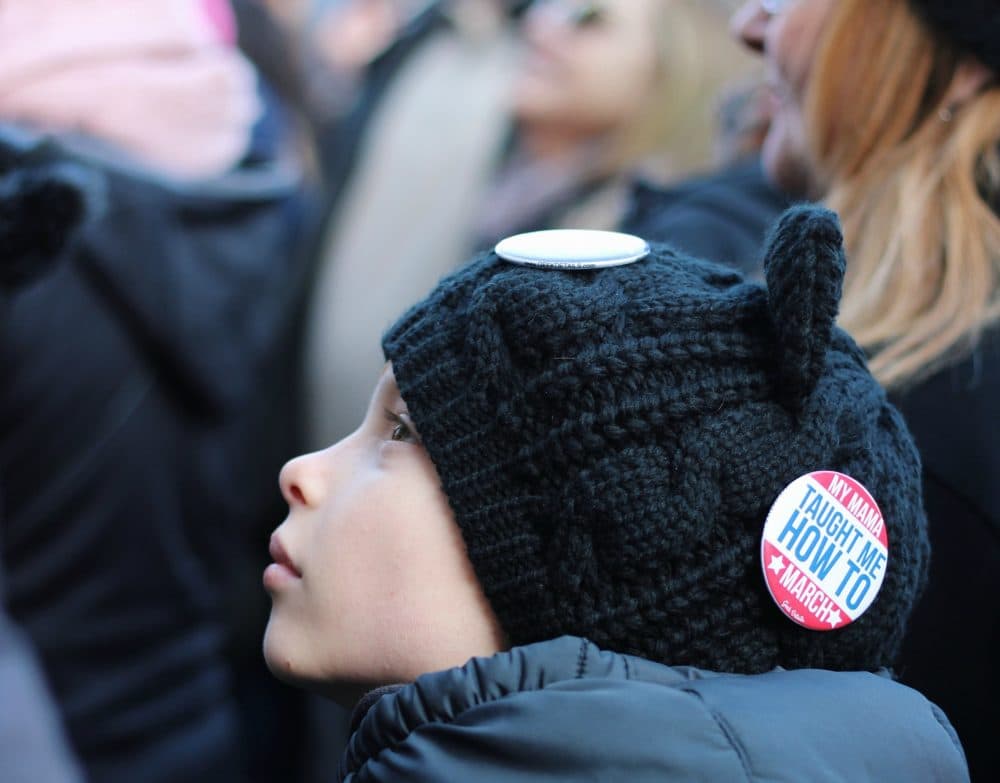
Many parents told us they make it a point to be open with their kids about almost everything.
If you don’t talk about the issues, then you don’t educate your kids. They may become afraid of things that are foreign or don’t want to be involved or engaged — and we don’t want our children to be that way. — Maria Brooks of Grand Prairie, Texas. Mother to daughter, C, 21 and son, T, 15.
We hold almost nothing back. Our 3-year-old even has his morning milk on the couch and demands CNN on the TV when he does. The older boys like seeing the headlines and knowing what’s happening, especially being able to ask questions about it. We try to use language and concepts they can understand. — Shaun Adamec of Ashland, Mass. Father to three sons: W, 3, L, 6, H, 7
I don’t see how sheltering my son from the horrors of this world would help him in anyway. I see it only hurting him in the future. — Amanda Sheehan of Massachusetts. Mom of a son, J, 4.
If I don’t engage my children in the issues, someone else will. They need to know what’s going on and they need to be ready to vote when the time comes. — Meghan Jones of Wilmington, Mass. Mom to daughters A, 14 and B, 12.
I teach my kids that there are different levels of danger. There’s a higher level of danger, meaning violence in schools, but there are some people who went down the wrong path and have chosen to harm others. I want my kids to be aware that that exists — but know they can choose a different path. -- Tara Mazanec of Cambridge, Mass. Mom to daughter S, 8 and son C, 3.
Advertisement
Plenty of parents preferred to shelter their children from some of the harsher news of the day, at least for now.
I find that I lean toward sheltering my kids from the details of the news if I can. We might talk about what to do in an emergency, especially when they aren't with mom and dad. The more I watch the news, the further I lean toward moving off the grid! — Michele Carroll of Hyde Park, Boston. Mom to daughter, Z, 9 and son, R, 6.
Our world is frightening enough to live in...can we just keep some of the most devastating things away from the little ones? At least until they are a bit older? — Jessica Alpert of Newton, Mass. Mom to twins, N and T, 5.
My now 20-year-old son, C, was in preschool for 9/11. I hid the newspapers, never turned on the TV when he was in the room, etc. But then kids at school — 4-year-olds! — were talking about it because their parents let them watch it all. So I realized that I would always have to find a way to tell him the least amount of information possible that would fill him in but not terrify him. — Louise Kennedy of Newton, Mass. Mom to son, C, 20 and daughter, A, 9.
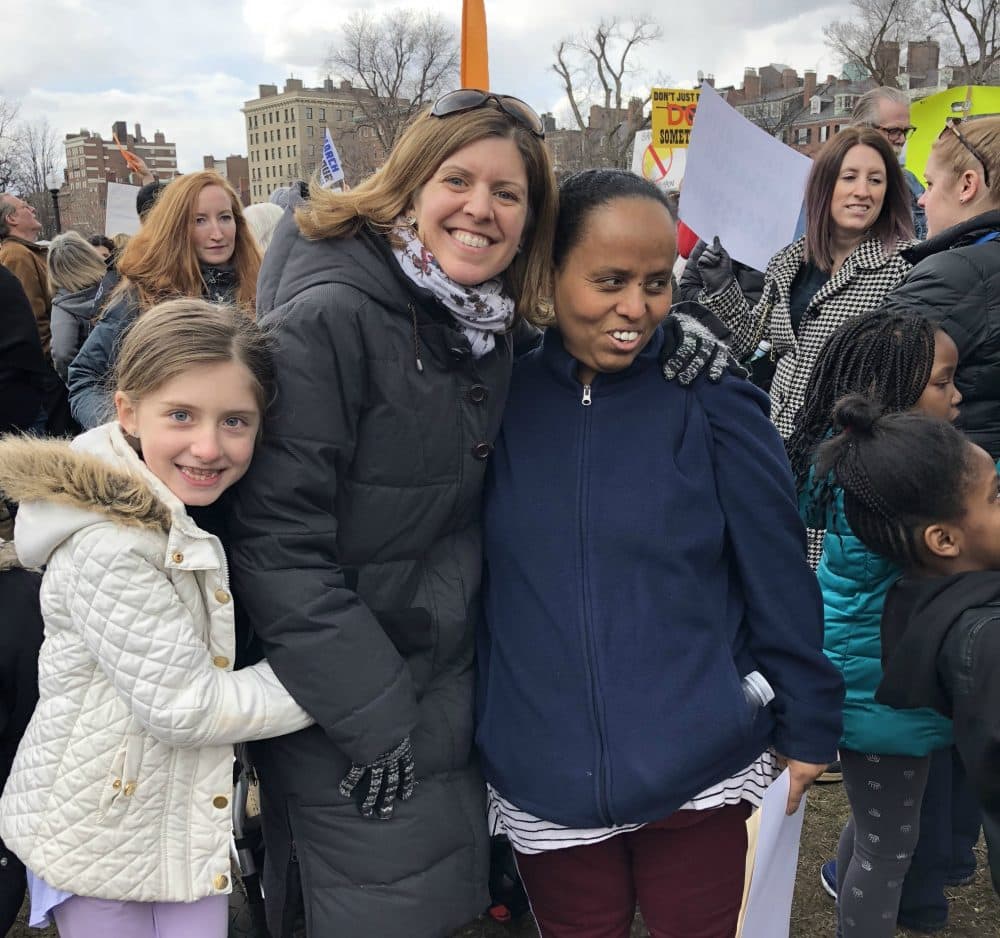
Using books, volunteering, dinner-table conversations and visits to the voting booth are some of the ways parents are introducing their children to social justice issues and civic responsibility.
We try to stay focused on three things: The golden rule, words and actions have consequences, doing our best even if it’s not the easiest thing to do. Kinda seems like the opposite of what you see in the news these days. It’s a mess. But the kids are alright. It’s almost impossible to shelter them much anymore. The BS finds them. — Dan Hardie of Miami, Fla. Dad to twin girls, L and P, 13.
I think the best thing we can do, and we should probably do more of it, is volunteer. Everything for my 3-year-old son is so concrete — so helping people on an individual level, has the potential to be the best for him. — Abby Taylor of Somerville, Mass. Mom to son, J, 3.
I’ve made a conscious effort to bring our beliefs and values regarding gender, sexuality, feminism, race, religion, etc. into his life through books. In addition to all of the old and new classic kids books, I consciously choose books that have characters that represent a variety of gender identities, races, religions and specifically teach about tolerance. — Abigail Flanagan of Concord, Mass. Mother to son, M, 1.
Parents also told us they tried to think about how their child would benefit from being exposed to the news of the day.
I think you have to talk about the issues; you have to have a conversation to help kids understand that they are safe and have some words to understand the things that they’re seeing. And to be reminded that people are good. — Gretchen Smith of Wendell, Mass. Mom to E, 23 and D, 27.
If your reason for involving your kids in your protest is because you think they can understand it and contribute that’s one thing. But if your reason is to make yourself look like the mom who’s brave enough to scare their kids, that’s quite another. — Meghan Figueroa of Edina, Minn. Mother to two daughters, P, 7 and M, 4.
I try to question why I’m sharing. Is this information they are asking about? Does it help them in the world? Or is it more about my identity and uncomfortability with my privilege. — Liz Marino of Dedham, Mass. Mother to two daughters, G, 5 and E, 3.
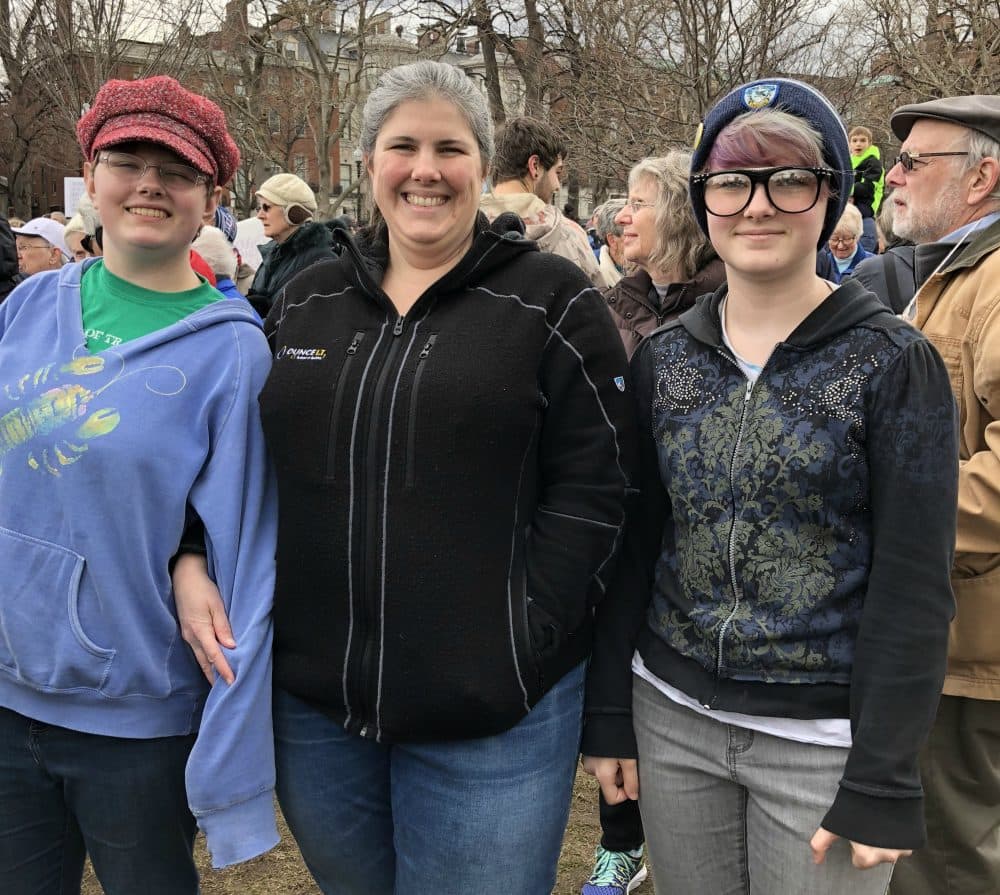
A couple of parents said they hesitated to expose their kids to the news, because they didn’t feel optimistic about the future or confident that the tenor of our politics would improve.
I’m doing a lot more to keep them in a bubble than I am to engage them with what’s going on. There's just so much ugliness out there, and I know it’s going to creep in eventually. Maybe in some ways it reflects my own fears about whether or how I can sincerely and with conviction tell them it’s going to get better. — Patrick Dillon of Chevy Chase, Md. Dad to twin girls, M and K, 5.
I grew up pretty exposed to all of society's issues, and I don't think it was an issue for me, but I think that stems from the confidence and passion my parents spoke about it with. I think it was clear to me that we were fighting for what was right and that we would triumph. That's what I have a hard time with these days, I feel less confident about the future than I think my parents ever did. — Andy Dean of Newton, Mass. Dad to son, N, 8 and daughter, E, 6.
In the aftermath of the school shooting in Parkland, Florida, parents and their kids are talking about the lockdown drills that happen in school.
The other night we came home to to K saying: “Dad, you have to learn about a really serious and important new fire drill I learned today.” One for “when the fire is outside and we have to go in a corner and be very very quiet and turn the lights off and we have to do it very very quickly.” She and M then proceeded to demonstrate by crouching down in the corner of the room, and they both genuinely thought they were teaching my wife and me something. — Patrick Dillon of Chevy Chase, Md. Dad to twin girls, M and K, 5.
The fact that we actually have these lockdown drills is a testament to what’s happening in our society. I feel like if they have to do that, than we should tell them why and then try to fight for their safety — and not just kids, but everyone’s. — Mary Warner of Milton, Mass. Mother to daughters A, 9 and A, 2 and son, C, 6.
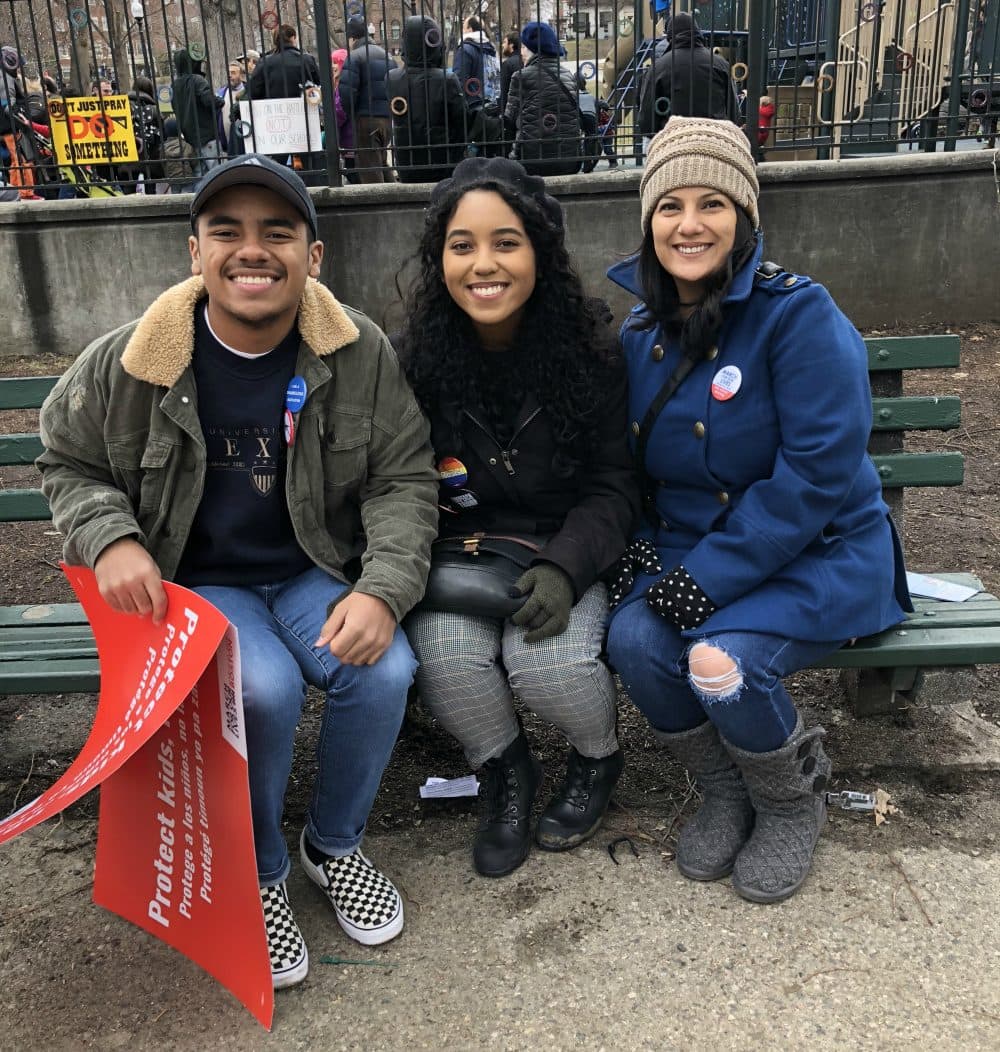
Finally, parents — along with a few mental health professionals who replied to our call — were eager to empower their children in a way that is developmentally appropriate.
In some ways common sense is a good guideline, and so if your child seems to have a lot of anxiety and you have the television playing in the background all the time it may create unintended anxiety. If the news is watched and sparks dialogue and guided discussion, then it is an effective tool. Metabolizing some of the toxicity that is present these days is a good skill to offer to our children. — Nancy Rappaport, Md, associate professor of psychiatry at Harvard Medical School
From my years of mentoring/training work one core concept is that you let kids lead — and they’ll help set the stage for what they can handle and what is helpful and it will be different kid to kid — even at the same age. — Liz Marino of Dedham, Mass. Mother to two daughters, G, 5 and E, 3.
I think we need to talk about feelings, being human and that in the end, we all want and need to feel connected. In that way, human beings are the same. -- Elissa Tosi, LICSW, of Marblehead, Mass. Mother to two daughters, O, 25 and L, 21.

